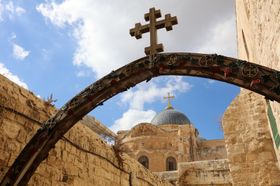Who Was Crucified Next to Jesus?
Updated November 19, 2024.

Jesus was not crucified alone; instead, two "thieves" were nailed up beside him. The stories of these two men, and the roles they played in the message of Jesus, are sometimes misunderstood. We take a dive into these intriguing biblical characters and explore how their different reactions shaped their destinies.
The Good Thief and the Unrepentant Thief
On the left of Jesus was a man named Gestas—to complain or to moan in Greek—and on the right, Dismas—the Greek word for "death" or "sunset." The Gospel of Luke names them thieves or robbers, and the apocryphal Book of Nicodemus gives us their names. "Saint Dismas the good thief" is often depicted wearing a loincloth, sometimes holding his cross, and sometimes even in paradise.
» Uncover the identity of the man who helped Jesus carry the cross
Why Gestas and Dismas Were Crucified
Recent historical studies have found that Crucifixion was actually quite a rare punishment in Rome; thieves usually had to repay what they stole along with added fines and were subjected to other smaller forms of retribution. However, traveling bandits—who were also often political rebels—were endemic to the Roman Empire. This seems a more likely match of these characters and their punishment. In fact, "killed by bandits" was a common inscription on many Roman gravestones.
It has also been argued by some scholars that Dismas may have been a "Robin Hood" type bandit - that he may have had a noble cause. A fitting ancient Roman folklore character, by the name of Bulla Felix, fits this description.
How Did the Two Thieves React to the Presence of Christ?
Dismas
Dismas felt guilty about his actions and didn't complain about his crucifixion at all. He exercised humility, taking responsibility for what he did and owning his mistakes. He saw the innocence, selflessness, and glory of Christ.
Dismas recognized Jesus as the Son of God and asked him to take him to heaven, as is written in Luke 23:42:
This is why in ancient paintings, he often appears to be in heaven, depicted as a saint.
Gestas
Gesta means “deeds” or “acts” in Latin—and Gestas felt the effects of his acts by being selfish and taunting Jesus along with the crowd.
Gestas said, “Aren’t you the Messiah? Save yourself and us!” Dismas rebuked him:
Gestas had the same opportunity that Dismas did—to repent, to see the majesty of the Lord, and to ask for forgiveness—but he turned away instead. Gestas was not a saint and chose to suffer for eternity rather than move closer to God.
The Lesson We Are Taught From Gestas and Dismas
Suffering vs. Repentance
Suffering is not the same thing as repentance. Being punished does not atone for the sins of a person; it is only when they take responsibility and make an effort to connect to the righteous side of themselves, that they may truly be forgiven and embraced by the warm love and salvation of God. Jesus will forgive those who accept their "crosses"—those who come to Him to repent and show an interest in making the right moral choices.
» Walk the path of forgiveness: Explore the history of the Via Dolorosa
Timeless Lessons
The lessons of Gestas' and Dismas' stories are timeless; they can be applied to our everyday lives and habits even now. When at a crossroads of righteousness, there is always the opportunity to move toward the light of God and do the right thing; and after sin has been committed, there is always the chance to bear the consequences with grace, and then ask for forgiveness.
» Embrace forgiveness & renewal: Discover Yom Kippur traditions
The Value of Dismas and Gestas’ Story for Parents and Teachers
Parents and teachers have a huge responsibility—and a huge blessing—to help shape the character of their children and students. When punishment is given to children or teenagers without adequate explanation, the child may not fully understand, and hence not be able to repent. They may suffer the punishment, without realizing where their mistake was, or fully taking responsibility for their actions. They need to grasp why what they did was wrong in a moral sense, accept the consequences, and ask for forgiveness in an authentic way—just as Dismas did in this powerful and important bible story.







